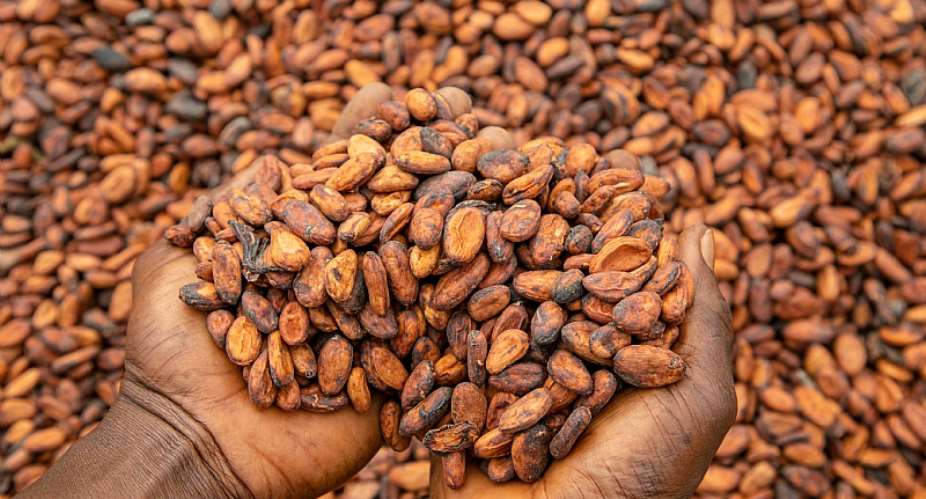Mr Alex Asanvo, the Executive Secretary for Cote d'Ivoire Ghana Cocoa Initiative (CGCI), says Global Cocoa Marketing Companies have refused to pay realistic prices for farmers and producers.
He questioned why buyers of the commodity have over the years failed to truly live up to their billing by paying actual prevailing prices often quoted by global news cables.
The Executive Secretary was speaking at the ongoing World Cocoa Conference in Brussels in a panel discussion on the topic: “The quest for the living income of smallholder farmers: why are we stuck and how can we fix it.?”
He said the Global Cocoa buyers had always exploited the market to their benefit, a development he believed always left farmers and producing countries at the bottom of an inequitable trade regime.
He said amid the increasing prices of Cocoa on the Global Market, farmers, and civil society groups in producing countries are making a strong demand on buyers to apply the 10,000 dollars as the basis for payment to reflect current trends.
The demand, in the view of Mr Asanvo, was putting pressure on governments in terms of domestic pricing, which is not reflected in the market.
“Today, all the global news cables are quoting $10,000 dollars as price for Cocoa on the international markets; this has put pressure on governments of producing countries as farmers and civil society groups push for local prices to be set at prevailing figures on the international markets,” he added.
Mr Asanvo said there were excessive demands from buyers on producing countries without commensurate actions from the market players themselves, stressing that there was a lack of trust, consistency, and stability in all facets of arrangements amongst the various key stakeholders in the Global Cocoa value chain.
He said this had over the years impinged effective implementation of policies and programmes, including the Living Income Differentials (LID) for the benefit of farmers.
The Executive Secretary said more needed to be done to actualize an ideal compensation for the toil and sweat of farmers.
He emphasized the question of whether the LID had failed its intended purpose or not, saying despite the criticisms, the circumvention and the weaknesses encountered as a result of origin differential downsides, the policy had still survived and continues to target a floor price to enable farmers to get a living income.
According to Mr Asanvo, to engender trust, there was the need for accountability and transparency from all stakeholders, arguing that this was being done by producing countries through the constant publication of the average achieved forward sale price and building a traceability system where not only volumes but prices would be traced.
He contended that like producing countries, the companies also be more accountable and transparent.
The Executive Secretary advocated for consistency on issues of sustainability, stressing that living income should be mainstreamed across the sustainability regulations of exporting and importing countries.
According to him, sustainability voluntary programmes should reward farmers with a living income or living income price, since the issue of sustainable cocoa cannot be attained without paying farmers a living income.
Mr Asanvo advocated stable and predictable market forces to help shape expectations towards an ambitious plan that guarantees a living income for farmers.
He said, “producing need a predictable floor price, with a dedicated mechanism to deliver it irrespective of terminal market prices since history showed that commodity markets were prone to price falls as sudden as price rises and sadly for farmers, falls were way longer than rises.”
GNA





 Ejisu by-election: Police questions Kwadaso MP, two others over bribery allegati...
Ejisu by-election: Police questions Kwadaso MP, two others over bribery allegati...
 Nana Kwame Bediako is Nkrumah’s reincarnate; he’ll be president if he appoints N...
Nana Kwame Bediako is Nkrumah’s reincarnate; he’ll be president if he appoints N...
 Dumsor: Mahama gave us ‘dum, dum, dum’ but we are now in the era of ‘dum sie sie...
Dumsor: Mahama gave us ‘dum, dum, dum’ but we are now in the era of ‘dum sie sie...
 You have no right to demand KPMG report on SML deal; it’s a written bonafide of ...
You have no right to demand KPMG report on SML deal; it’s a written bonafide of ...
 Bawumia is like a chew-and-pour classmate; he crumbles when given practicals — B...
Bawumia is like a chew-and-pour classmate; he crumbles when given practicals — B...
 Dumsor: We're almost seeing the end of it — Sammi Awuku
Dumsor: We're almost seeing the end of it — Sammi Awuku
 I’ll kneel down on TV and apologize to Mahama; he’s an angel compared to Akufo-A...
I’ll kneel down on TV and apologize to Mahama; he’s an angel compared to Akufo-A...
 Government’s communication on cocaine scandal has been an unmitigated disaster –...
Government’s communication on cocaine scandal has been an unmitigated disaster –...
 FDA uncovers expired food items from storerooms of Zuarungu SHS
FDA uncovers expired food items from storerooms of Zuarungu SHS
 I’ll make small-scale miners millionaires – Bawumia
I’ll make small-scale miners millionaires – Bawumia
